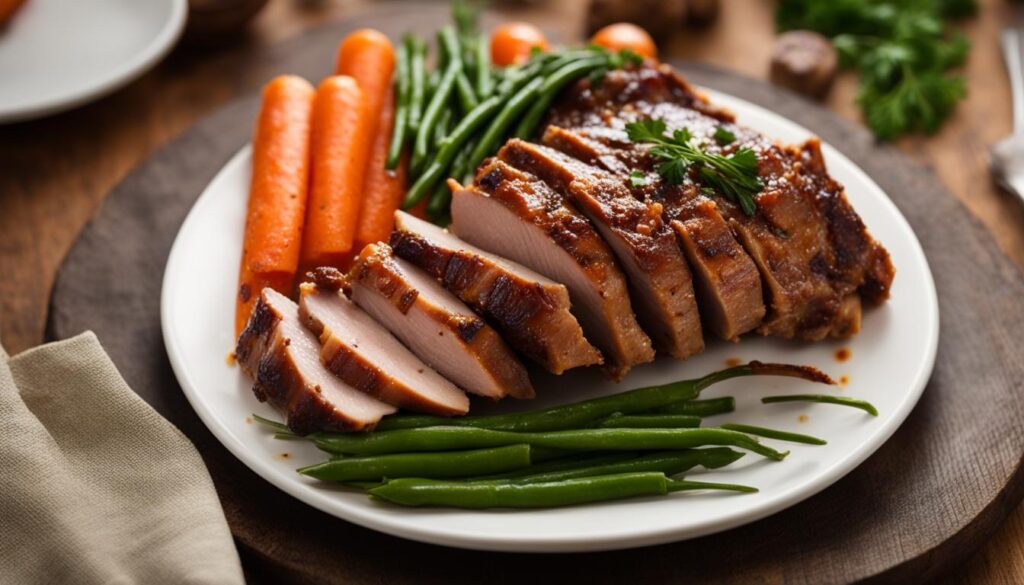Turkey necks are a common food item that many dog owners wonder about. Can dogs eat turkey necks? The answer is yes, but there are important considerations to keep in mind to ensure the safety and well-being of your furry friend.
Turkey necks are not only safe for dogs to eat, but they also offer several benefits. They are a rich source of high-quality protein and contain essential minerals, such as calcium and phosphorus. Additionally, turkey necks provide natural sources of glucosamine and chondroitin, which support joint health and mobility in dogs.
It’s important to note that while turkey necks are safe for dogs, the same cannot be said for cooked poultry bones. Cooked bones can splinter easily and pose a choking hazard or cause internal injuries to dogs. Therefore, it is crucial to only offer raw or dehydrated turkey necks to your furry companion.
Feeding turkey necks to dogs can also contribute to their dental health. Chewing on the necks helps remove plaque and tartar buildup, promoting healthier teeth and gums. Additionally, the act of chewing provides mental stimulation and serves as a natural outlet for a dog’s chewing behavior.
When it comes to sourcing turkey necks for your dog, it’s essential to choose safe and reliable sources. Raw turkey necks can be purchased from farmers markets, butcher shops, or the meat department of grocery stores. Dehydrated turkey necks can be found online or in pet supply stores. Always opt for products made and sourced in the USA to ensure quality and safety.
Key Takeaways:
- Turkey necks are safe and nutritious for dogs to eat.
- They are high in protein and contain essential minerals.
- Raw or dehydrated turkey necks are safe treats for dogs, while cooked bones should be avoided.
- Turkey necks promote dental health, mental stimulation, and serve as a natural outlet for chewing behavior.
- When buying turkey necks, choose safe and reliable sources, preferably made and sourced in the USA.
Nutritional Benefits of Turkey Necks for Dogs

Turkey necks offer several nutritional benefits to dogs. They are rich in high-quality protein, making them an excellent source of sustenance for our four-legged friends. Protein is essential for muscle development, repair, and overall growth in dogs. It provides the building blocks for healthy tissues and helps maintain a strong immune system.
In addition to protein, turkey necks contain important nutrients such as glucosamine, chondroitin, calcium, and phosphorus. Glucosamine and chondroitin are especially beneficial for joint health and mobility, as they help maintain the integrity of cartilage and reduce inflammation. Calcium and phosphorus are essential for healthy bones and teeth, playing a crucial role in maintaining a dog’s overall skeletal structure.
One of the lesser-known benefits of turkey necks is their dental advantage. Chewing on turkey necks can help remove plaque and tartar buildup, promoting good dental hygiene in dogs. The natural gnawing action helps scrape away residue and stimulates saliva production, which naturally cleanses the teeth and gums.
Furthermore, the act of chewing on turkey necks provides mental stimulation for dogs, which is important for their overall mental and emotional well-being. Dogs have an innate need to chew, and providing them with appropriate chew options like turkey necks can help satisfy this instinct while keeping them mentally engaged.
In summary, feeding turkey necks to dogs offers a range of nutritional benefits. They are a natural and wholesome source of high-quality protein, glucosamine, chondroitin, calcium, and phosphorus. These nutrients support joint health, promote dental hygiene, and provide mental stimulation to keep dogs happy and healthy.
Where to Buy Turkey Necks for Dogs

When it comes to purchasing turkey necks for your furry friend, there are several options available. For raw turkey necks, you can visit local farmers markets, butcher shops, or check the meat department of your nearest grocery store. This ensures that you can find fresh and high-quality turkey necks that are suitable for your dog’s consumption.
If you prefer dehydrated turkey necks, you can find them online or at pet supply stores. Dehydrated turkey necks are a convenient and long-lasting option that can be easily stored and served to your dog as a healthy treat.
However, it’s important to note that not all sources are safe and reliable. When purchasing turkey necks, it’s crucial to avoid products that are imported from China or have questionable origins. Instead, opt for turkey necks that are sourced and made in the USA. This ensures that you are providing your dog with safe and trustworthy products.
How to Safely Feed Turkey Necks to Dogs
Feeding turkey necks to dogs can be a nutritious and enjoyable part of their diet. However, it’s important to take certain precautions to ensure their safety and well-being. Here are some considerations to keep in mind:
Appropriate Size for Dogs
When choosing turkey necks for your dog, it’s essential to consider their size and chewing capabilities. Turkey necks are best suited for medium to large dogs, as they provide an appropriate level of chewing challenge. For small dogs, chicken necks may be more suitable. Ensuring the neck size matches your dog’s breed and size will help prevent choking hazards and ensure a positive eating experience.
Supervision while Feeding
It’s crucial to supervise your dog while they are enjoying a turkey neck. This allows you to ensure they are chewing the neck properly and not swallowing large pieces. Dogs can sometimes get excited while eating and may try to gulp down their food without proper chewing. By keeping an eye on them, you can intervene if necessary and prevent any potential risks.
Adjusting Meals and Water Intake
Since turkey necks are a substantial source of protein and nutrition, it’s important to make adjustments to your dog’s overall meal plan. Depending on the size of the turkey neck and your dog’s dietary needs, you may need to reduce their regular meal portion to maintain a balanced diet. Additionally, always provide access to fresh water, especially after they have consumed a turkey neck, as it can be quite dense in nutrients.
| Considerations | Actions |
|---|---|
| Choose the appropriate size turkey neck | Select a neck that matches your dog’s size and chewing abilities. |
| Supervise your dog while feeding | Keep an eye on your dog to ensure they are chewing the neck properly and not trying to swallow large pieces. |
| Adjust meals and water intake | Make necessary adjustments to your dog’s overall meal plan and provide fresh water after consuming a turkey neck. |
By following these guidelines, you can safely incorporate turkey necks into your dog’s diet and provide them with a satisfying and nutritious chewing experience.
Benefits of Raw Turkey Necks for Dogs

Raw turkey necks offer numerous benefits for dogs, providing them with essential nutrients and promoting their overall well-being. Unlike cooked turkey necks, which may pose risks, raw turkey necks are safe to eat and offer natural sources of glucosamine and chondroitin.
“Raw turkey necks are a natural and nutritious option for dogs, offering a range of health benefits that can improve their joint health, dental well-being, and mental stimulation.”
1. Natural Sources of Glucosamine and Chondroitin
Raw turkey necks contain natural sources of glucosamine and chondroitin, which are essential compounds for supporting joint health in dogs. These compounds can help alleviate arthritis symptoms and improve overall mobility. The raw nature of turkey necks ensures that these beneficial compounds remain intact and readily available for absorption.
2. Dental Health Benefits
Chewing on raw turkey necks provides dental health benefits for dogs. The chewing action helps remove plaque and tartar buildup, reducing the risk of periodontal disease and promoting healthier teeth and gums. It serves as a natural way to clean their teeth, improving their oral hygiene and preventing dental issues.
3. Mental Stimulation Benefits
Chewing on raw turkey necks offers mental stimulation for dogs, engaging their natural chewing instincts and providing a healthy outlet for their energy. It can help alleviate boredom, reduce destructive behaviors, and provide a calming effect. The act of chewing can be mentally stimulating and satisfying for dogs, promoting their overall well-being.
In summary, raw turkey necks provide dogs with natural sources of glucosamine and chondroitin, promoting joint health and mobility. They also offer dental health benefits by aiding in the removal of plaque and tartar. Additionally, chewing on turkey necks provides mental stimulation and serves as a natural outlet for a dog’s chewing behavior.
Can Dogs Chew on Turkey Necks?

Dogs can safely chew on raw turkey necks. Raw bones, including turkey necks, are soft and pliable, making them safe for dogs to chew. Chewing on raw bones provides several benefits, including dental health, mental stimulation, and a natural outlet for chewing behavior.
Raw turkey necks offer a natural and nutritious option for dogs to satisfy their chewing instincts. The soft texture of raw bones allows dogs to gnaw and chew, promoting dental health by helping to remove plaque and tartar buildup. Regular chewing on raw turkey necks can also provide mental stimulation for dogs, preventing boredom and reducing destructive chewing behaviors.
It’s important to note that cooked bones, including cooked turkey necks, should never be given to dogs. Cooked bones become brittle and can splinter easily, posing a serious risk of injury to dogs. The sharp splinters can cause choking, blockages, or damage to the digestive tract. Therefore, it’s crucial to only offer dogs raw turkey necks to ensure their safety.
Chewing on raw turkey necks can offer a range of benefits for dogs, including:
- Promoting dental health by reducing plaque and tartar buildup
- Stimulating mental activity and preventing boredom
- Providing a natural outlet for chewing behavior
When introducing turkey necks as a chew option for your dog, it’s essential to consider their size. Turkey necks are best suited for medium to large dogs, as they can be too large for small breeds or puppies. Make sure to supervise your dog while they chew on a turkey neck to ensure they don’t try to swallow large pieces, which can be a choking hazard.
To summarize, dogs can safely chew on raw turkey necks, which provide dental health benefits, mental stimulation, and fulfill their natural chewing instincts. Avoid giving dogs cooked bones, including cooked turkey necks, as they can pose significant risks to their health and safety.
| BENEFITS OF CHEWING ON RAW TURKEY NECKS |
|---|
| Dental Health Promotion |
| Mental Stimulation |
| Natural Outlet for Chewing Behavior |
Cooked Turkey Necks for Dogs

Feeding cooked turkey necks to dogs can pose significant risks to their health and well-being. When cooked, turkey bones become hardened and glass-like, making them highly prone to splintering. These sharp bone fragments can cause serious injuries to dogs when swallowed or chewed on.
It is crucial for pet owners to understand the dangers of feeding cooked bones to dogs. Cooked bones, including turkey necks, can splinter into sharp shards that can lodge in a dog’s throat, esophagus, or digestive tract. This can lead to choking, internal tearing, blockages, or even perforation of the intestines. The consequences can be life-threatening and require immediate veterinary intervention.
As a responsible pet owner, it is important to prioritize the safety and well-being of your furry companion. Avoid giving cooked turkey necks or any other cooked bones to your dog. Instead, opt for safe and appropriate alternatives that offer similar nutritional benefits without the associated risks.
The Risks of Cooked Bones
Feeding cooked bones to dogs can pose serious health risks, including choking, internal injuries, and digestive tract blockages. It is crucial to avoid giving your dog cooked turkey necks or any other cooked bones to ensure their safety and well-being.
Understandably, many pet owners may be unaware of the potential dangers associated with feeding cooked bones to dogs. Bones, when cooked, undergo structural changes that weaken their integrity and make them more likely to splinter. This applies to all types of cooked bones, including turkey necks.
The risks of feeding cooked bones to dogs include:
- Choking Hazard: Cooked bone fragments can get stuck in a dog’s throat, posing a choking hazard that may require immediate intervention.
- Injuries to the Digestive Tract: Sharp bone splinters can cause lacerations, punctures, or tears in a dog’s esophagus, stomach, or intestines, leading to internal bleeding or infections.
- Blockages: Cooked bone fragments can obstruct a dog’s digestive tract, making it difficult or impossible for them to pass stool. This can result in severe discomfort, pain, and the need for surgical removal.
Given these potential risks, it is best to err on the side of caution and avoid feeding cooked bones, including cooked turkey necks, to dogs entirely.
The Importance of Safe and Healthy Dog Treats
While it’s essential to steer clear of cooked bones as dog treats, there are numerous safe and healthy alternatives available. High-quality dog treats made specifically for canine consumption provide a range of benefits, including enhanced nutrition, dental health, mental stimulation, and positive reinforcement during training sessions.
When selecting dog treats, look for products that are:
- Soft and easily chewable
- Made from safe and digestible ingredients
- Free from harmful additives, preservatives, or artificial flavors
- Specifically designed for canine consumption
Consulting with your veterinarian can also help you find suitable and healthy treat options that align with your dog’s needs, preferences, and dietary requirements.
Raw Turkey Necks for Dogs

Raw turkey necks are a healthy and nutritious option for dogs. They offer several benefits, including high-quality protein, essential minerals, and natural sources of glucosamine and chondroitin. This raw feeding approach, which includes incorporating raw bones like turkey necks, aligns with the natural diet of dogs and provides numerous advantages for their overall well-being.
When selecting raw turkey necks for your canine companion, it is crucial to ensure they are sourced from reputable suppliers that prioritize quality and safety. This guarantees that the turkey necks are free from additives, preservatives, and other harmful substances that could potentially harm your dog.
| Benefits of Raw Turkey Necks for Dogs |
|---|
| High-quality protein |
| Essential minerals |
| Natural sources of glucosamine and chondroitin |
Raw turkey necks provide dogs with a rich source of high-quality protein, which is essential for muscle building, maintenance, and repair. They also contain vital minerals such as calcium and phosphorus, which contribute to strong bones and teeth.
Additionally, raw turkey necks contain natural sources of glucosamine and chondroitin, compounds that support joint health and can help alleviate conditions like arthritis. These natural supplements promote flexibility, reduce inflammation, and support overall joint mobility in dogs.
It is important to note that while raw turkey necks are generally safe for dogs to consume, it is essential to consult with your veterinarian before introducing them to your pet’s diet, especially if your dog has any pre-existing health conditions.
Raw Feeding for Dogs
Raw feeding, which includes incorporating raw turkey necks into a dog’s diet, is gaining popularity among pet owners seeking a natural and species-appropriate approach to nutrition. Advocates of raw feeding believe that it provides dogs with a diet closely resembling what their ancestors consumed in the wild, resulting in numerous health benefits.
However, it is essential to understand raw feeding principles and guidelines to ensure the well-being of your dog. Consulting with a veterinarian or a veterinary nutritionist experienced in raw feeding can help you design a balanced and suitable raw diet plan based on your dog’s unique needs.
Remember, raw turkey necks should be served raw to dogs. Cooking the bones can make them brittle and prone to splintering, posing a choking or internal injury hazard to dogs.
Can Dogs Eat Turkey Necks as Dog Treats?
Turkey necks can be a fantastic option for dog treats, offering both taste and health benefits. They are packed with nutrients and provide a variety of advantages for your furry friend. One of the main benefits of using turkey necks as dog treats is their positive impact on dental health. Chewing on turkey necks helps remove plaque and tartar buildup, promoting good oral hygiene and reducing the risk of gum disease.
Moreover, turkey necks contain essential minerals like calcium and phosphorus, which are crucial for maintaining strong bones and teeth. Additionally, turkey necks are rich in glucosamine and chondroitin, natural compounds that support joint health and mobility in dogs. This makes turkey necks an excellent option for older dogs or those with joint issues.
Furthermore, treating your dog with turkey necks provides mental stimulation. Chewing is a natural instinct for dogs and can help relieve stress, anxiety, and boredom. By offering turkey necks as treats, you allow your dog to engage in this instinctive behavior while ensuring their safety and well-being.
If, for any reason, turkey necks are not suitable for your dog or if you prefer alternatives, there are various other options available. Commercial dog treats specifically designed to promote dental health and joint support can be suitable alternatives. Homemade treats made from safe and dog-friendly ingredients, like carrots or sweet potatoes, can also be a healthy and tasty choice for your dog’s treat time.
Remember to always choose treats that are appropriate for your dog’s size, age, and health condition. It’s essential to consult with your veterinarian to determine the best treat options for your furry companion.
In conclusion, turkey necks can be a great addition to your dog’s treat repertoire, offering dental health benefits, joint support, and mental stimulation. However, if turkey necks are not a viable option, alternative treats are readily available in the market or can be made at home to ensure your dog remains happy, healthy, and satisfied.
Wrapping Up
After careful consideration, it is clear that dogs can safely eat turkey necks and enjoy several benefits from doing so. Turkey necks provide dogs with high-quality protein, essential minerals, and natural sources of joint support. Feeding turkey necks as part of a balanced diet can promote dental health, support joint mobility, and provide mental stimulation for dogs.
However, it is crucial to ensure that turkey necks are sourced from reputable and safe sources. It is recommended to buy raw turkey necks from farmers markets, butcher shops, or trusted meat departments of grocery stores. Online and pet supply stores also offer dehydrated turkey necks as an alternative option.
When feeding turkey necks to dogs, it is important to consider the appropriate size for your dog and to supervise them as they chew. Medium to large dogs are better suited for turkey necks, while small dogs can benefit from chicken necks instead. Adjusting meals and water intake may also be necessary when incorporating turkey necks into a dog’s diet.
In conclusion, when handled correctly and sourced from reliable sources, turkey necks can be a safe and nutritious addition to a dog’s diet. The high protein content, essential minerals, and joint support they provide make them a beneficial treat for dogs.
FAQ
Can dogs eat turkey necks?
Yes, turkey necks are safe and nutritious for dogs to eat. They are high in protein and contain calcium, phosphorus, glucosamine, and chondroitin, which support joint health and mobility.
What are the nutritional benefits of turkey necks for dogs?
Turkey necks provide dogs with high-quality protein, essential minerals like calcium and phosphorus, and natural sources of glucosamine and chondroitin. These nutrients promote joint health, mobility, and overall well-being. Additionally, chewing on turkey necks aids in dental health by removing plaque and tartar.
Where can I buy turkey necks for dogs?
Raw turkey necks can be purchased from farmers markets, butcher shops, and the meat department of grocery stores. Dehydrated turkey necks can be found online or in pet supply stores. Always choose safe and reliable sources, preferably sourced and made in the USA.
How should I safely feed turkey necks to my dog?
It is important to consider the appropriate size of turkey necks for your dog. They are best suited for medium to large dogs, while chicken necks are better for small dogs. Supervise your dog while they are chewing on turkey necks to ensure proper chewing and to prevent them from swallowing large pieces. Adjusting meals and water intake may be necessary when incorporating turkey necks into your dog’s diet.
What are the benefits of raw turkey necks for dogs?
Raw turkey necks provide dogs with natural sources of glucosamine and chondroitin, supporting joint health and potentially alleviating arthritis symptoms. They also promote dental health by aiding in plaque and tartar removal. Chewing on turkey necks can provide mental stimulation and serve as a natural outlet for a dog’s chewing behavior.
Can dogs chew on turkey necks?
Yes, dogs can safely chew on raw turkey necks. Raw bones are soft and pliable, making them safe for dogs to chew. However, cooked bones should be avoided as they become brittle and can splinter, posing a risk of injury to dogs.
Are cooked turkey necks safe for dogs?
No, cooked turkey necks should never be given to dogs. The high cooking temperatures make the bones hard and glass-like, increasing the risk of splintering and causing serious injuries. It is important to avoid feeding any cooked bones to dogs, as they can pose a choking hazard and cause intestinal damage.
Can dogs eat raw turkey necks?
Yes, raw turkey necks are a safe and beneficial option for dogs. They provide high-quality protein, essential minerals, and natural sources of glucosamine and chondroitin. Raw feeding, which includes raw bones like turkey necks, is a natural and nutritious diet choice for dogs.
Can dogs eat turkey necks as dog treats?
Yes, turkey necks can be used as healthy and nutritious dog treats. They offer dental health benefits, joint support, and mental stimulation for dogs. However, if turkey necks are not suitable for your dog or if you prefer alternatives, there are other options available, such as commercial dog treats or homemade treats made from safe and dog-friendly ingredients.
Can dogs eat turkey necks, and what are safe feeding tips?
Dogs can eat turkey necks safely, following these tips: ensure the appropriate size for your dog, supervise while chewing, and avoid giving cooked bones. Turkey necks offer numerous nutritional benefits and promote dental health, joint mobility, and mental stimulation for dogs.






